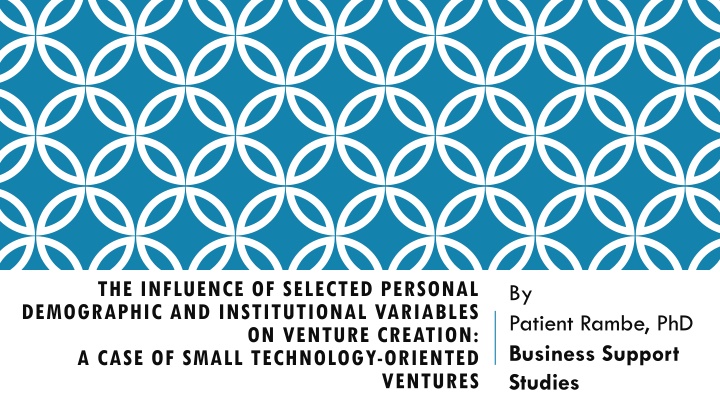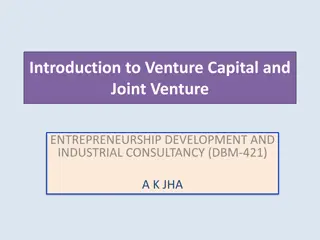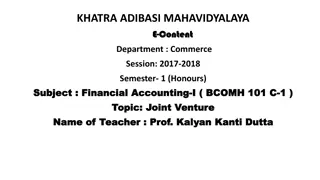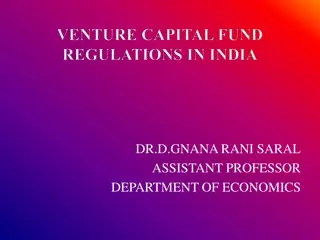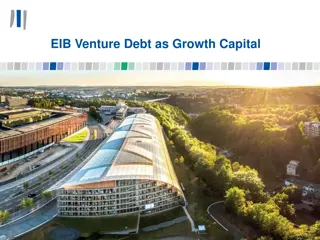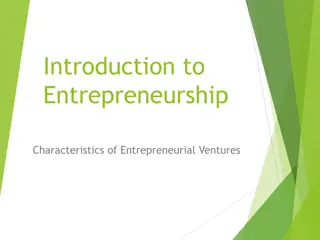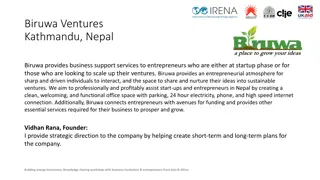Influence of Personal Demographic and Institutional Variables on Venture Creation in Small Technology-Oriented Ventures
This research study explores the impact of personal demographic and institutional factors on venture creation in small technology-oriented ventures. It delves into the influence of individual characteristics like age, gender, education, and social institutions such as family role models on entrepreneurial success. Findings suggest that age, gender, and experience play pivotal roles in the entrepreneurial journey, with different age groups exhibiting varying levels of entrepreneurial tendencies. The study highlights the importance of considering both individual-centric and society-centric perspectives when analyzing venture creation dynamics.
Uploaded on Sep 27, 2024 | 0 Views
Download Presentation

Please find below an Image/Link to download the presentation.
The content on the website is provided AS IS for your information and personal use only. It may not be sold, licensed, or shared on other websites without obtaining consent from the author.If you encounter any issues during the download, it is possible that the publisher has removed the file from their server.
You are allowed to download the files provided on this website for personal or commercial use, subject to the condition that they are used lawfully. All files are the property of their respective owners.
The content on the website is provided AS IS for your information and personal use only. It may not be sold, licensed, or shared on other websites without obtaining consent from the author.
E N D
Presentation Transcript
THE INFLUENCE OF SELECTED PERSONAL DEMOGRAPHIC AND INSTITUTIONAL VARIABLES ON VENTURE CREATION: A CASE OF SMALL TECHNOLOGY-ORIENTED By Patient Rambe, PhD Business Support Studies VENTURES
PRESENTATION OUTLINE Introduction Parallel studies Problem statement Research questions Methodology Findings Recommendations
INTRODUCTION AND PROBLEM STATEMENT Individual-centric studies on VC Society-centric studies on VC Postulate personal demographic variables (e.g. gender & age) as prime micro-level determinants of venture creation (Dautzenberg 2012; Kee & Rahman, 2018) Foreground the role of individual entrepreneur traits in opportunity identification and resource mobilization. However, they downplay the role of social institutions in VC Emphasise influence of social variables like institutional (e.g. family role models & family recognition of VC) variables on venture creation (Sefiani 2013; Sarbah and Xiao 2015; Stamarski and Hing, 2015). Environmental influences are seedbeds of entrepreneurial intentions & VC venture creation thrives They often ignore the role of personal demographic attributes in VC
FILTERING INDIVIDUAL-CENTRIC APPROACHES AND THEIR EFFECT ON VC Entrepreneur s age, gender, income level, education, employment status, work experience and mastery of English language have considerable effect on EI and VC (Chiliya and Roberts-Lombard, 2012; da Costa and Mares, 2016) Research suggest that age, gender, education and work experience have a strong influence on entrepreneurial success (Chowdhury, Alam, and Arif 2013; Fatoki 2014). While many demographic characteristics impact VC generally, the entrepreneur s age and gender are the influential yet controversial variables emphasized in mainstream entrepreneurial literature (Seenivasan 2014; Wasdani and Mathew 2014; Daniels, Herrington, and Kew 2016)
AGE AND VENTURE CREATION RELATIONSHIP Rate of venture creation and entrepreneurial success increases with age (especially after 25 Years) compared to those younger (Islam et al. (2011; Tweneboah-Koduah and Adusei, 2016) Associates high risk taking, opportunity identification and conscientiousness in business decision making with youth than older mature individuals (Awa, Emecheta, and Ukoha 2015; Olugbola 2017). Positive correlation Opportunity entrepreneurs are older (35 44 years) than necessity entrepreneurs (18 24 years) but decreases with age (Giacomin et al. 2011; Bijaoui 2012; Ndofirepi, 2016; Rambe and Ndofirepi 2016). Older opportunity-driven entrepreneurs possess more business experience and income to run business successfully (Rambe, 2019). Negative correlation Early-stage entrepreneurship is moderately low in the 18 24 years group, peaks among 25 34 year olds, and then declines as age increases with the sharpest decrease after the age of 54 (Daniels, Herrington, and Kew 2016). An individual advanced in age is less motivated to implement innovative behaviours or new ideas compared to a younger manager who would be more persuaded to take risks (Olugbola, 2017). Curvilinear relationship
GENDER AND VENTURE CREATION Gender gap perspective Different values perspective Men are 75% more likely than women to become active entrepreneurs 2015) Women are more likely than men to restrict their authoritative decisions on the entrepreneurship due to lack of confidence and trust in their capacities (Vossenberg 2013). Males and females have different desires and values for pursuing entrepreneurship (Fafaliou and Salam, 2014) (Stander, Women entrepreneurs are likely than men to run lower turnover, lower growth potential businesses such as cleaning, healthcare, and (Urban, 2011). Men prefer technological entrepreneurship while women desire lower revenue generating (Brooks et al. 2014; Salamouris 2014). Lack exposure opportunities and limited business awareness seem women s success (Wasdani and Mathew, 2014; Mpiti, 2016; Rambe and, Mpiti, 2017) of confidence, resources, limited business education services to innovation to undermine businesses Fafaliou and
SOCIETY-CENTRIC APPROACHES AND VENTURE CREATION Family role model is [a family member who serves as] a common reference to individuals, sets an example to be emulated by others and inspires other individuals to make certain decisions (Bosma et al. 2012). It is likely that an entrepreneur and his/her spouse s expectations about starting a new venture have an impact on the decision to start a new venture (Liang and Dunn 2010).
FAMILY ROLE MODEL AND VENTURE CREATION EI and Entrep Behaviour Resource mobilization Attitude formation Role models shape an individual s decision to become an entrepreneur and influence entrepreneurship behaviour (Ozaralli and Rivenburgh 2016). Role models compensate for a new entrepreneur s lack of business experience by providing expert advice and support (Caliendo and Kritikos (2011) Bae et al. (2014) highlight that children who grow up in a family with self-employed family members may lead to a pro-business attitude. Parental role models may also impart on their children a sense of assertiveness towards becoming self-employed (Chlosta et al. 2012).
FAMILY RECOGNITION OF VENTURE CREATION AND VC From a Family embeddedness perspective affirms that family norms, attitudes and values may impact on the new venture creation decision, influencing founding strategies and processes (Kirkwood, 2012) Creativity, innovation, goal orientation and hard work values established in the family may be instrumental in business incubation. Value propagation Family plays a critical role in aspiring entrepreneurs at the venture preparation stage and business creation stages (Morgenroth, Ryan, and Peters 2015; Tarling, Jones, and Murphy 2016). They shape entrepreneurial behaviour through value propagation, provision of finance and moral support Business Creation Family members serve as resource reservoirs to potential entrepreneurs who lack access to other social support networks (Gathungu & Mwangi, 2014). Kibler (2012) has discovered how family networks impact the development and recognition of entrepreneurial opportunities and resources, and the final decision to create new ventures Resource Pooling
PROBLEM STATEMENT Individual-centric approaches emphasise individual traits and personal choices that entrepreneurs make that activate EIs and make VC possible (Dautzenberg 2012; Kee and Rahman, 2018) Society-centric approaches present the ideal operational climate through which incubation happens and VC succeed (Sefiani 2013; Sarbah and Xiao 2015) BOTH perspectives are partial, selective narratives that fail to fully capture VC - their complementation would render an integrated picture of VC. Studies bridging the individual society gap are theoretically grounded and founded on systematic literature reviews (Henry, Foss and Ahl 2015; Rambe and Mokgosi, 2016), but lack a strong empirical foundation.
RESEARCH QUESTIONS 1. What is the age and gender composition of owner/managers of internet caf s in the Mangaung Metropolitan Area and Matjhabeng Local Municipality? 2. How do these personal demographic (age and gender) variables influence venture creation? 3. How do institutional (e.g. family role models and family recognition of venture creation) variables influence the creation of technology-oriented ventures in the MMA and Matjhabeng Local Municipality?
METHODOLOGY Survey on owners/managers of emerging technology-oriented firms in the Mangaung Metropolitan Area and Matjhabeng Local Municipality. No database for small internet cafes in these areas FDC estimates - 95 SMMEs covering these areas Census conducted on the 91 available SMMEs
SURVEY METHOD Questionnaire structure: Section A - demographic data Section B -family role models and family recognition of venture creation. Section C - data on venture creation. 58 questionnaires were completed - a response rate of 63.7%. Overall, the questionnaire had high reliability (Cronbach s alpha statistic = 0.938).
RELIABILITY ANALYSIS Construct Number of items Cronbach's Alpha Comment Family role models 7 0.917 High internal consistency Questions 12, 13, 14, 15, 16, 17, 18 Family recognition of venture creation (a) 6 0.860 High internal consistency Questions 19, 20, 21, 22, 23, 24 Family recognition of venture creation (b) 4 0.914 High internal consistency Questions 25, 26, 27, 28 New venture: Opportunity identification 6 0.913 High internal consistency Questions 46, 47, 48, 49, 50, 51 New venture: Risk taking 4 0.845 High internal consistency Questions 52, 53, 54, 55 New venture: Resource mobilisation 5 0.902 High internal consistency Questions 56, 57, 58, 59, 60 New venture: Implementation of business 4 0.782 High internal consistency decisions Questions 61, 62, 63, 64 0.938 High internal consistency Overall questionnaire All Likert scaled questions 36
Personal details Category Frequency Percentage Male 31 53.4% Q1. Gender Female 27 46.6% <20 years 3 5.2% 21-30 years 36 62.1% Q2. Age in years 31-40 years 16 27.6% 41-50 years 1 1.7% 51-65 years 2 3.4% White 9 15.5% Black 43 74.1% Q3. Race Coloured 5 8.6% Asian 1 1.7% No formal Education 2 3.4% Primary 2 3.4% Middle School 1 1.7% Q5. Highest academic qualification High School 28 48.3% Tertiary 22 37.9% Postgraduate 3 5.2% Owner 10 17.2% Manager 20 34.5% Q6. Role in the business Owner/Managers 3 5.2% Other 25 43.1%
T-TESTS FOR THE EFFECTS OF GENDER ON NEW VENTURE CREATION VARIABLES
NATURE OF FAMILY ROLE MODELS Nature of family role models Category Frequency Percentage Spaza shop 2 3.4% Fabric shop 3 5.2% Hair Salon 1 1.7% Q8. Which type of business does your role model own? Internet caf 21 36.2% None 22 37.9% Other (specify) 9 15.5% Yes 12 20.7% Q9. Do any one of your parents own a business? No 46 79.3% Yes 32 55.2% Q10. Do any of your extended family members have a business? No 26 44.8% Yes 27 46.6% Q11. Do you regard any of your family members as your business role models? No 31 53.4%
T-TEST FOR THE EFFECTS OF PARENTS OWNERSHIP OF BUSINESS ON ENTREPRENEURS VENTURE CREATION
T-TEST FOR THE EFFECTS OF EXTENDED FAMILYS OWNERSHIP OF BUSINESS ON THE ENTREPRENEUR S VENTURE CREATION
T-TEST FOR THE EFFECTS OF REGARDING FAMILY MEMBERS AS ROLE MODELS ON VENTURE CREATION
CORRELATIONS BETWEEN LIKERT SCALED ROLE MODEL AND VENTURE CREATION VARIABLES
DISCUSSION- GENDER AND VENTURE CREATION More males running technology-oriented SMMEs than females. Technology oriented entrepreneurship remains a male dominated area (Vinesh, 2014) T-test results revelated that gender is a significant factor affecting: Opportunity identification (t = 2.511, df = 56, p-value =0.015). Males (mean = 4.124) scored higher than females (3.617) on opportunity identification. Risk taking (t = 2.483, df = 56, p-value = 0.016). Males (mean = 4.202) scored higher than females (3.694) on risk taking. Implementation of business decisions (t = 2.687, df = 56, p-value = 0.009) with males again scoring higher than the females. BUT does not significantly affect resource mobilization (t = 0.886, df = 56, p-value = 0.380), which means that males and females fare equally on resource mobilization.
DISCUSSION AGE AND VENTURE CREATION Majority (89.7%) of entrepreneurs were young adults (21- 40 years). Supports the fact that the most business owners are generally aged between 20 - 44 years old (Kalane 2015). ANOVA tests show that age does not significantly affect any of new venture variables (all p-values are greater than 0.05). However, mean plots revealed that venture creation peaked with age.
FAMILY ROLE MODELS Almost half (48.3%) of respondents professed that encouragement of parents/guardians shaped their ability to run businesses. Parental role models and mentors play a pivotal role in shaping the entrepreneurs development (Botha and Bignotti 2016). Few business owners (37.9%) agreed that family influenced their decision to create their businesses. Somewhat contradicts Singh and Prasad s (2016) finding that being raised in entrepreneurial family influences an individual s intention to engage in entrepreneurship.
FAMILY ROLE MODELS 79.3% of respondents parents did not own businesses, 53.4% did not regard family members as their business role models, BUT 55.2% indicated that their extended family members owned businesses. 51.7% of respondents agreed that their exposure to parents who ran businesses influenced their attitude towards being self-employed. Supports Kazeem and Asimiran s (2016) finding that children whose parents are self-employed often consider entrepreneurship as a career. T-Tests revealed that NONE of venture creation dimensions is significantly influenced by regarding family members as role models (all p-values are greater than 5%).
FAMILY ROLE MODELS AND VENTURE CREATION Opportunity identification is: positively and significantly correlated with family role models B1 (Correlation 0.389, p-value = 0.003), but not significantly correlated with family recognition of venture creation (a) (Correlation = 0.200, p-value = 0.133), and family recognition of venture creation (b) (Correlation = 0.224, p- value =0.091). While the entrepreneur s identification of opportunities may be affirmed by family role models, these ideas may not be readily supported by the entire family due to a climate of failure of new ventures in South Africa. Meyer s (2015) finding that while society and stakeholders may readily affirm the recognition of certain opportunities by an entrepreneur, family members may not always give sufficient support and legitimacy to such ideas.
ROLE MODELS, FAMILY RECOGNITION OF VC AND VC Risk taking is: positively and significantly correlated with family role models (Correlation = 0.469, p value = 0.000) but not significantly correlated with family recognition of venture creation (a) (Correlation = 0.259, p-value = 0.056), and family recognition of VC (b) (Correlation = 0.241, p-value =0.068). Implies that role models can be supportive of entrepreneurs risky business pursuits even though their whole family may not support their business pursuits due to uncertainties involved in such ventures. Moulson (2015) reports that an entrepreneur s risk taking can be propelled by family role models even though other risk averse family members may try to protect the entrepreneur against the expected negative consequences of risk business venturing.
ROLE MODELS, FAMILY RECOGNITION OF VC AND VC Implementation of business decisions is: positively and significantly correlated with family role models (Correlation = 0.514, p-value = 0.000), family recognition of venture creation (a) (Correlation = 0.406, p value = 0.002) and family recognition of venture creation (b) (Correlation = 0.368, p- value = 0.004). This means that families play a critical role in assisting their siblings to create ventures. Milani et al. (2016) support this finding by emphasizing the significant role played by families in creating and running new business ventures successfully.
RECOMMENDATIONS Age does not significantly affect the new venture variables and therefore, the creation of technology-oriented ventures cannot be conceived to be ideal to a particular age group as all age groups lend themselves to venture creation HEIs and mentoring institutions should adopt a trans-generational approach to venture support approach to ensure that all age groups meaningfully benefit from venture creation Gender is a significant factor affecting new venture creation dimensions namely, opportunity identification, risk taking, implementation of business decisions but does not significantly affect resource mobilization. Business venture training institutions should consider a strong gender inclusive approach to training on business incubation and entrepreneurship to ensure women s full effective participation in the entire cycle of business incubation.
RECOMMENDATIONS Families influenced: children s attitudes towards being self-employed, provided encouragement to operate businesses successfully influenced children s decisions to start new businesses but did not provide financial support for new start-ups created by their family members. Financial institutions should take a proactive role in supporting new start-ups to fill the void left by social institutions such the family.
REFERENCES AVAILABLE UPON REQUEST THANK YOU FOR LISTENING
